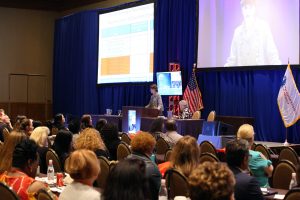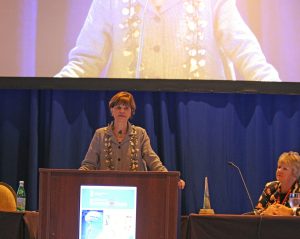Acting deputy undersecretary for Health Policy and Services opens 8th Annual PVA Healthcare + Summit
Even with the Department of Veterans Affairs (VA) facing so much turmoil and adversity, two constants are change and improvement.
That message was clear during Tuesday’s first plenary session delivered at the 8th annual Paralyzed Veterans of America (PVA) Healthcare Summit + Expo at the Omni Dallas Hotel in downtown Dallas, Texas.
Energy filled the Trinity Ballroom as hundreds of clinicians, doctors, psychologists, physical and occupational therapists, social workers and more learned from Lucille Beck, PhD, acting deputy undersecretary for Health Policy and Services for the Veterans Health Administration (VHA), about the work being done in the VHA’s Rehabilitation & Prosthetic Services.

Beck said her time as an acting deputy undersecretary for the last year has underscored the value of what the Summit attendees do every day.
“Boots on the ground, interacting with veterans, listening to veterans, providing an excellent veteran experience,” Beck said. “That is our system, and that is what those of us who work in Washington [D.C.] try to do every day is try to develop programs and make services available to all of you that will continue to provide the absolute wonderful rehabilitation venues and technology utilization for care.”
Beck discussed an initiative for which PVA helped advocate that involves improving the process for wheelchair prescriptions.
“The technology is just exploding, and I think by the time we meet next year there will be even more developments,” Beck said. “We are beginning very important work to assure that we are providing not only state of the art technology that’s individualized for our veterans, but also to be sure that our providers, in particular our therapists, are knowledgeable, trained, and that we’ve made that interaction so that our veterans have a great experience, that they leave their visit with the proper information, that they have a point of contact with Prosthetics and Sensory Aid Service, and they know the time they can expect to receive their wheelchair.”
In addition, Beck said the VHA is starting to use 3D printing in several research facilities and polytrauma centers to create personalized prosthetics and is building assistive technology labs to train providers and veterans.
“I think someday every veteran will have an iPad and be able to communicate with each of you whenever they need to, as well as receive a lot of services through apps and various things, and I think that’s one of our goals, to work in that area as we expand telehealth and telerehabilitation,” Beck said.
When it comes to infrastructure, Beck said the VHA is working to improve access with direct scheduling for outpatients. That system allows veterans to schedule directly with any clinic where they need to be seen, rather than going through a primary care physician to get a consultation with a specialist to obtain needed items, such as prosthetic limbs or a wheelchair. The goal, she said, is to eliminate the backlog of open cases.
“We are growing so quickly … the clinical services are key of course, but we have to have really good, efficient business processes to support the clinical services, so we’re working on that quite a bit as well,” Beck said.
New processes are being developed for procurement of prosthetic devices as well, including securing funds and contracts.
“Whatever the technology needs are are individualized to the needs of the veteran,” Beck said. “Two veterans might have the same injury, might have the same impairment, but very different technology needs. So we have experts working in our clinics, we have procurement strategies that allow us to purchase what the veterans need.”
In addition to providing more technology, expanding access to adaptive sports and creative arts and improving care coordination between medical centers for veterans with multiple sclerosis are priorities for the department, Beck said.
“We are all about education, we are all about training, we are all about collaboration as we establish these programs, and I don’t want to forget to tell you that we are all about family, caregivers, supporting family,” Beck said.
Beck said a prosthetics team meets quarterly with veterans service organizations and welcomes input from PVA and clinicians who may have issues obtaining prosthetic devices.
“We come out to all of you in the community, say, ‘Hey, what’s going on? How do we streamline this? How do we get it solved?’ So that’s been a very effective way. Not only does it solve problems, but it helps us understand some of the issues that we need to be addressing,” Beck said.
Collaborating to solve issues is a major part of the Summit’s purpose, and PVA Executive Director Carl Blake acknowledged the importance of making those connections.
“This is important work,” Blake said. “I’ve worked in Washington (D.C.) most of my life when I wasn’t in the Army, and I hear everything. I know the scrutiny you all are placed under on a daily basis. I hear it from all angles, from Congress, from your own leadership, especially from the press, but I say don’t believe that hype. You are doing the yeoman’s work, and you should be proud of what you’re doing. You really do make a difference. It matters to me, it matters to [PVA National President] David [Zurfluh], it matters to our members, it matters to every veteran who walks through the door of the VA. So don’t be discouraged by what gets reported, because I know the truth and I know you all know the truth.”



